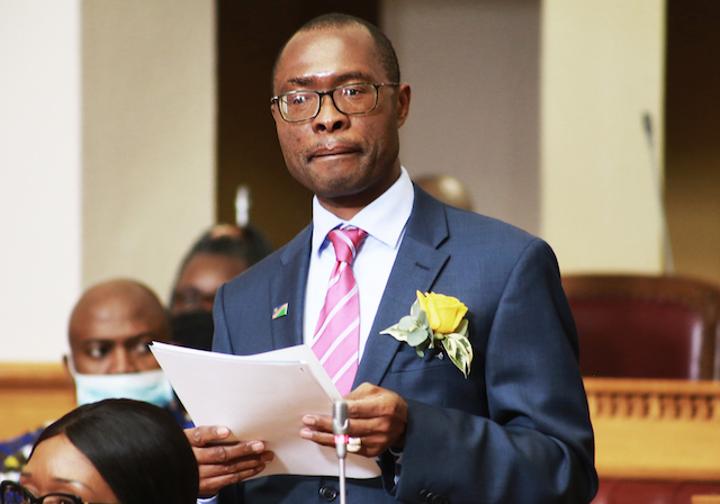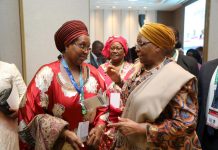Africa-Press – Namibia. LAZARUS AMUKESHE and NGHIINOMENWA ERASTUSIT has been an interesting year – and in the words of the Johannesburg Stock Exchange, trust no one. Not even Trustco.
Proof is, even the government’s fishing quotas auction this year ended in tears – only bringing in N$8,4 million – a mere 1,3% of the N$628 million of what bidders promised.Promises in the dark it was.Several political parties also made noise this year during the recently held elections. It is noise because their promises lacked substance, and exposed their inability to understand the structure of the economy and its standing.But, all in all, the year started off relatively well. Former finance minister Calle Schlettwein even said we could look forward to some economic recovery after the economy suffered several blows amid his plate of optimism. His call was “we must transform our economy for growth and equality, we must kill corruption”. Thrown-around statements are that it was this strong stance on corruption that led to him being replaced by Iipumbu Shiimi as head of treasury – a softie and ‘yes-man’, according to some.Shiimi arrived at the ministry at a very bad time and now will forever be remembered to be the first finance minister to face government debts of over N$100 billion under his watch. The estimates, as he tabled them during the national budget, were shocking – a whopping N$117 billion debt balance and a N$21 billion budget deficit.Several analysts felt pity for him – others said he would do a good job. This remains to be seen.We can, however, bet a dollar on the fact that Shiimi’s appointment did not improve or reduce treasury – it remains as is. And we will explain: Six months down the line after his appointment in April, the minister tabled the midterm budget review, highlighting several reforms.The reforms as he tabled earned him a ‘superficial minister’ tag, because what the market thought they would get from a seasoned economist from the central bank was what they have been hearing all along from other politicians. Nothing new, no confidence, same old rhetoric.He has taken on the garment of a public servant it appears. Let us be fair as it is always easy to criticise.It was a rough year, Covid-19 messed up the economy badly. Yet, on the other hand, it scared the delay out of the government’s to-do list. Much was done this year, and speedily.It was good to see how the government acted fast on VAT refunds, the payment of invoices and the facilitation of a N$750 grant.Social media was abuzz over that grant, though a fraction of the people still claim the minister and his spokesperson, Tonateni Shidhudhu, are holding on to their money. Only they can answer. THE COMPLAINTA glance at the public sector causes one to conclude that many officials within the economic ministries in the country have no regard for the state of the economy whatsoever.The Ministry of Finance is probably the most disliked ministry in our view and particularly on two fronts – the attitudes at the tax office and the minister’s office.After his appointment, officials from the central bank took to social media saying Shiimi does not enjoy the limelight. His job however requires that he be active – the capital market thrives on news.But the silence oozing from the state’s purse keepers has become very disturbing.It used to be better with Schlettwein, maybe because he was media friendly, but our dear friend Shiimi is never reachable. He even went on early holiday this year.He is not in the office. He is not there. We understand he is officiating some soccer games at his village as headman. Is it that bad being in office less than a year? He gave the market no official comment on the recovery strategy which, according to what is being floated around by State House, will be launched next year February.It also brings about more confusion on who should lead the recovery strategy/plan of the country – whether it is the finance ministry, the president, or the less active National Planning Commission (NPC).The market is however eager to get guidance on the way forward, build expectations and adjust their consumption and production plans, and this is what most government officials fail to understand.We however need to give credit where it is due – the only two vocal entities in government are the Namibia Statistics Agency and the Bank of Namibia, which have been continuously showing a picture of no growth, contraction, and the stagnation of the Namibian economy for the whole year.However, for those who are supposed to follow up with policy intervention, such as the Ministry of Industrialisation and Trade, and the NPC, finances are nowhere to be found. Last week, the NSA released third-quarter figures. A few weeks before that the rating agencies downgraded Namibia’s ability to borrow more money to fund its persistent budget deficit. This dashed Shiimi’s hopes to acquire credit cheaply and fund his debt-dependent budget for the next five years. On these two critical statements the minister remains tight-lipped.THE DARK CLOUDFor 2020, apart from heavy debt accumulation in the next three years, treasury is placing its bets on the second Harambee Prosperity Plan (HPP II) and a handful of ‘superficial’ reforms to facilitate recovery.Emerging young economists have coined the termed ‘Namibian crony capitalism’, which is characterised by the misallocation of limited resources through deals based on political influence rather than merit. This hinders the productive reallocation of the common man’s resources and simultaneously reduces innovation and economic growth, because state funds are in the hands of a few individuals and are used for unproductive purposes.According to Shiimi, he planned to clear the dark cloud through the HPP II, together with a high-level panel recommendation advising the government to auction the country’s fish resources.Beyond the failed fish quota auction, the government has also announced an auction of elephants to the highest bidder, indicating that given the dry purse and narrowing tax base, more auctions can be expected in 2021. Shiimi said the yet-to-be-finalised HPP II will be directed at reigniting inclusive economic growth, job creation and social progression.Secondly, developmental projects would benefit from gaining private capital through public-private partnerships, leveraging state assets and improving the national investment climate.He also indicated he would facilitate a decongesting process regarding public procurement to improve the turnaround time for public tender allocation.Public procurement has been a pain for many entrepreneurs due to its sluggishness and inefficiency under the Public Procurement Act.Shiimi announced scaling up support of the SME sector and youth entrepreneurship by ensuring access to capital for start-ups and young people.CHAMPIONS OR NOT?Several other interesting events have happened this year in the economy. A commemorative N$30 note was launched. Taxi drivers say it is confusing them as their mathematics skills are limited to accurately deduct their N$12 from other notes only. We also saw several key appointments, including Johannes !Gawaxab as the Bank of Namibia governor, James Mnyupe as the new presidential economic adviser, Sam Shivute as the new NamRa head, and Nangula Uaandja is also headed to State House we understand.Former PwC tax partner Nelson Lucas now heads Standard Bank Namibia’s investment team, and Martha Murorua has taken over the reins at Nedbank Namibia.Mercia Geises was also announced as the new Standard Bank Namibia chief executive officer come May next year, taking over from Vetumbuavi Mungunda.This move now has Namibia’s banks led mostly by women. Some say Mungunda is running away from a shaky loan book, but the bank appears to be strong, riding on the back of the Standard Bank Group. Its shares are unfortunately still below its initial public offering (IPO) at N$6,90. IPO was at N$8,90.Standard Bank is not the only one in bad shape on the Namibian Stock Exchange. FirstRand Namibia has also not recovered yet after taking a hit in July from above N$30 per share to now hovering at N$23 a share.Other news included the Capricorn Group pulling out of Zambia this year – a much-awaited relief. All the banks this year made less than a billion in profit.Paratus, MTC and Telecom Namibia were the biggest winners this year – the basic need of connectivity gave them a real boost.The telecommunication gains also beg the question if the government will ever list part of MTC for the public to share in the profits.Trustco Holdings keep baffling brains with its ‘aggressive accounting’, although self-proclaimed social media experts say its something more dubious.Ohorongo Cement also never went to the Chinese. Regulatory policies were very accommodating this year – the repo rate hit an all-time low of 3,75%, consequently dropping the prime rate to 7,5%.Bank Windhoek introduced a 30-year bond, making properties cheaper, yet expensive. The same was extended to vehicle repayments, now stretched to six years.Fuel prices remained reasonable for the year, mainly due to oil prices that crashed at international level.This keeps inflation in check and provides a very ripe environment for growth. Covid-19-induced fears, however, keep robbing the nation of these benefits.Many were retrenched, and unemployment levels are scary. Several Namibians got salary cuts, and prayers are still going up for the hospitality and tourism sector.Those who got retrenchment packages have started small businesses and once-dormant skills are now at play. It was also this year the central government for the first time took the begging bowl to the International Monetary Fund – a move endorsed by respected analysts. It has been a difficult year, and the future really looks bleak. Covid-19 has dashed the hopes of many, but the business world still awaits the finance minister’s holiday speech. He must at least wish the market a meaningful break. On to 2021 then …Email: [email protected]namibian.com.na






